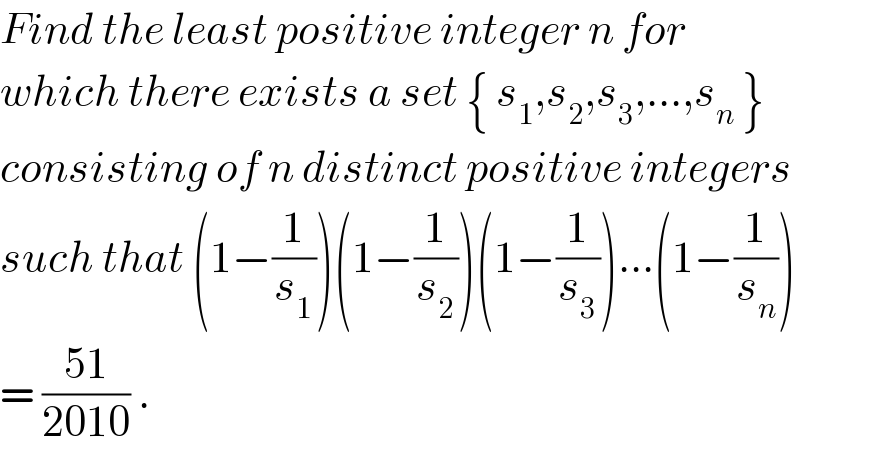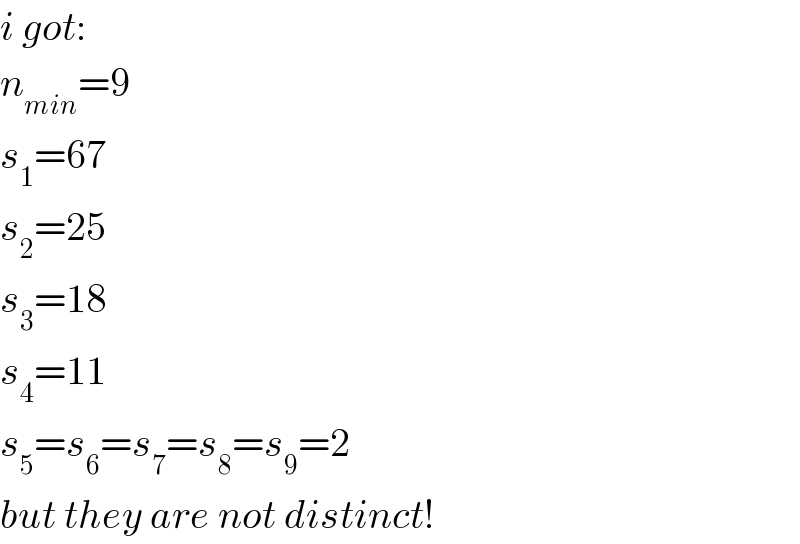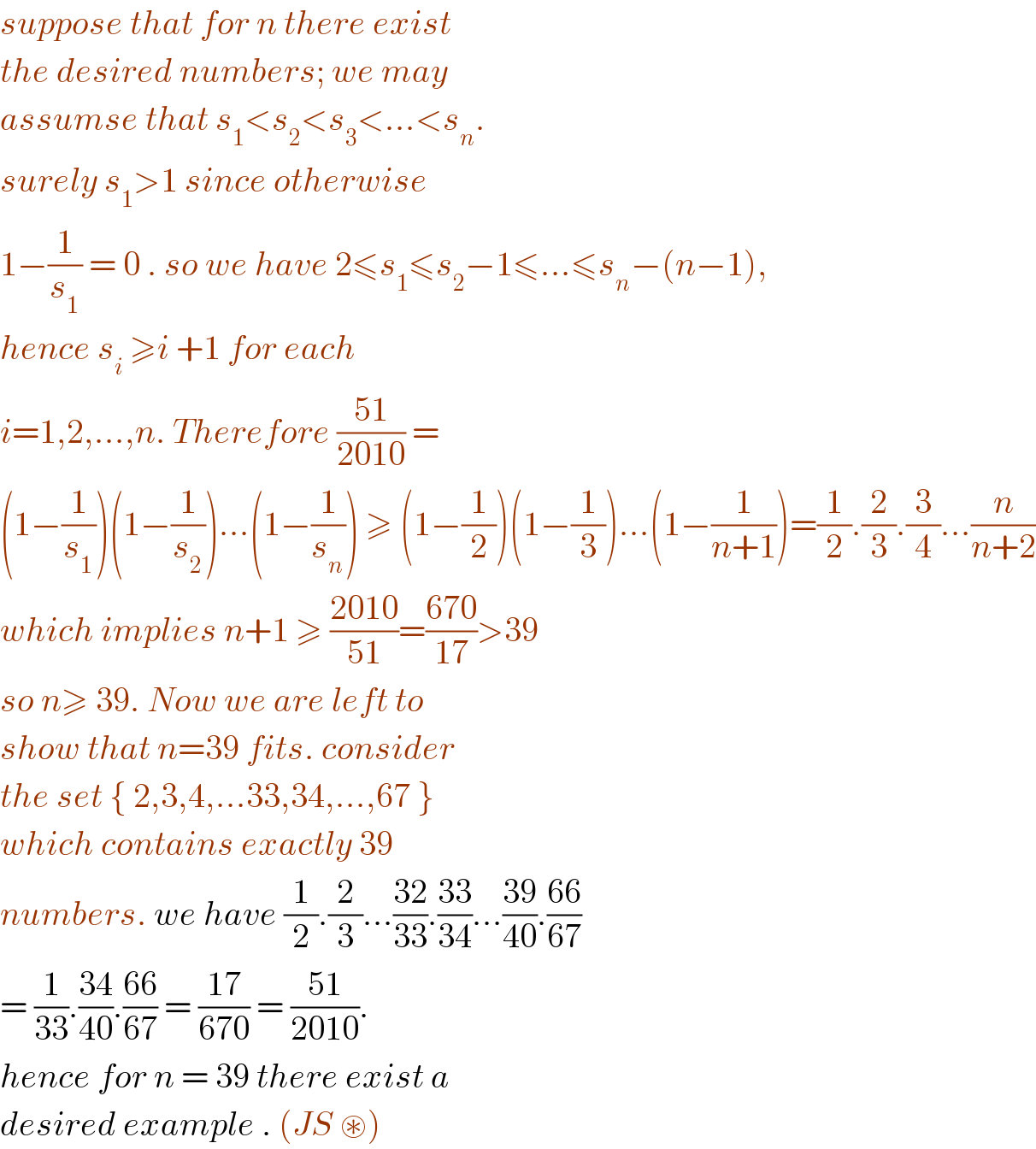
Question Number 103908 by bobhans last updated on 18/Jul/20

$${Find}\:{the}\:{least}\:{positive}\:{integer}\:{n}\:{for} \\ $$$${which}\:{there}\:{exists}\:{a}\:{set}\:\left\{\:{s}_{\mathrm{1}} ,{s}_{\mathrm{2}} ,{s}_{\mathrm{3}} ,...,{s}_{{n}} \:\right\} \\ $$$${consisting}\:{of}\:{n}\:{distinct}\:{positive}\:{integers} \\ $$$${such}\:{that}\:\left(\mathrm{1}−\frac{\mathrm{1}}{{s}_{\mathrm{1}} }\right)\left(\mathrm{1}−\frac{\mathrm{1}}{{s}_{\mathrm{2}} }\right)\left(\mathrm{1}−\frac{\mathrm{1}}{{s}_{\mathrm{3}} }\right)...\left(\mathrm{1}−\frac{\mathrm{1}}{{s}_{{n}} }\right) \\ $$$$=\:\frac{\mathrm{51}}{\mathrm{2010}}\:. \\ $$
Commented by Rasheed.Sindhi last updated on 18/Jul/20

$$\frac{\mathrm{51}}{\mathrm{2010}}=\frac{\mathrm{17}}{\mathrm{670}} \\ $$
Commented by bobhans last updated on 18/Jul/20

$${for}\:{n}\:=??\:{sir} \\ $$
Answered by mr W last updated on 18/Jul/20

$${i}\:{got}: \\ $$$${n}_{{min}} =\mathrm{9} \\ $$$${s}_{\mathrm{1}} =\mathrm{67} \\ $$$${s}_{\mathrm{2}} =\mathrm{25} \\ $$$${s}_{\mathrm{3}} =\mathrm{18} \\ $$$${s}_{\mathrm{4}} =\mathrm{11} \\ $$$${s}_{\mathrm{5}} ={s}_{\mathrm{6}} ={s}_{\mathrm{7}} ={s}_{\mathrm{8}} ={s}_{\mathrm{9}} =\mathrm{2} \\ $$$${but}\:{they}\:{are}\:{not}\:{distinct}! \\ $$
Answered by john santu last updated on 18/Jul/20

$${suppose}\:{that}\:{for}\:{n}\:{there}\:{exist} \\ $$$${the}\:{desired}\:{numbers};\:{we}\:{may} \\ $$$${assumse}\:{that}\:{s}_{\mathrm{1}} <{s}_{\mathrm{2}} <{s}_{\mathrm{3}} <...<{s}_{{n}} . \\ $$$${surely}\:{s}_{\mathrm{1}} >\mathrm{1}\:{since}\:{otherwise} \\ $$$$\mathrm{1}−\frac{\mathrm{1}}{{s}_{\mathrm{1}} }\:=\:\mathrm{0}\:.\:{so}\:{we}\:{have}\:\mathrm{2}\leqslant{s}_{\mathrm{1}} \leqslant{s}_{\mathrm{2}} −\mathrm{1}\leqslant...\leqslant{s}_{{n}} −\left({n}−\mathrm{1}\right), \\ $$$${hence}\:{s}_{{i}} \:\geqslant{i}\:+\mathrm{1}\:{for}\:{each} \\ $$$${i}=\mathrm{1},\mathrm{2},...,{n}.\:{Therefore}\:\frac{\mathrm{51}}{\mathrm{2010}}\:= \\ $$$$\left(\mathrm{1}−\frac{\mathrm{1}}{{s}_{\mathrm{1}} }\right)\left(\mathrm{1}−\frac{\mathrm{1}}{{s}_{\mathrm{2}} }\right)...\left(\mathrm{1}−\frac{\mathrm{1}}{{s}_{{n}} }\right)\:\geqslant\:\left(\mathrm{1}−\frac{\mathrm{1}}{\mathrm{2}}\right)\left(\mathrm{1}−\frac{\mathrm{1}}{\mathrm{3}}\right)...\left(\mathrm{1}−\frac{\mathrm{1}}{{n}+\mathrm{1}}\right)=\frac{\mathrm{1}}{\mathrm{2}}.\frac{\mathrm{2}}{\mathrm{3}}.\frac{\mathrm{3}}{\mathrm{4}}...\frac{{n}}{{n}+\mathrm{2}} \\ $$$${which}\:{implies}\:{n}+\mathrm{1}\:\geqslant\:\frac{\mathrm{2010}}{\mathrm{51}}=\frac{\mathrm{670}}{\mathrm{17}}>\mathrm{39} \\ $$$${so}\:{n}\geqslant\:\mathrm{39}.\:{Now}\:{we}\:{are}\:{left}\:{to} \\ $$$${show}\:{that}\:{n}=\mathrm{39}\:{fits}.\:{consider} \\ $$$${the}\:{set}\:\left\{\:\mathrm{2},\mathrm{3},\mathrm{4},...\mathrm{33},\mathrm{34},...,\mathrm{67}\:\right\} \\ $$$${which}\:{contains}\:{exactly}\:\mathrm{39} \\ $$$${numbers}.\:{we}\:{have}\:\frac{\mathrm{1}}{\mathrm{2}}.\frac{\mathrm{2}}{\mathrm{3}}...\frac{\mathrm{32}}{\mathrm{33}}.\frac{\mathrm{33}}{\mathrm{34}}...\frac{\mathrm{39}}{\mathrm{40}}.\frac{\mathrm{66}}{\mathrm{67}} \\ $$$$=\:\frac{\mathrm{1}}{\mathrm{33}}.\frac{\mathrm{34}}{\mathrm{40}}.\frac{\mathrm{66}}{\mathrm{67}}\:=\:\frac{\mathrm{17}}{\mathrm{670}}\:=\:\frac{\mathrm{51}}{\mathrm{2010}}. \\ $$$${hence}\:{for}\:{n}\:=\:\mathrm{39}\:{there}\:{exist}\:{a} \\ $$$${desired}\:{example}\:.\:\left({JS}\:\circledast\right)\: \\ $$
Commented by bobhans last updated on 18/Jul/20

$${thank}\:{you} \\ $$
Commented by mr W last updated on 18/Jul/20

$${very}\:{nice}! \\ $$
